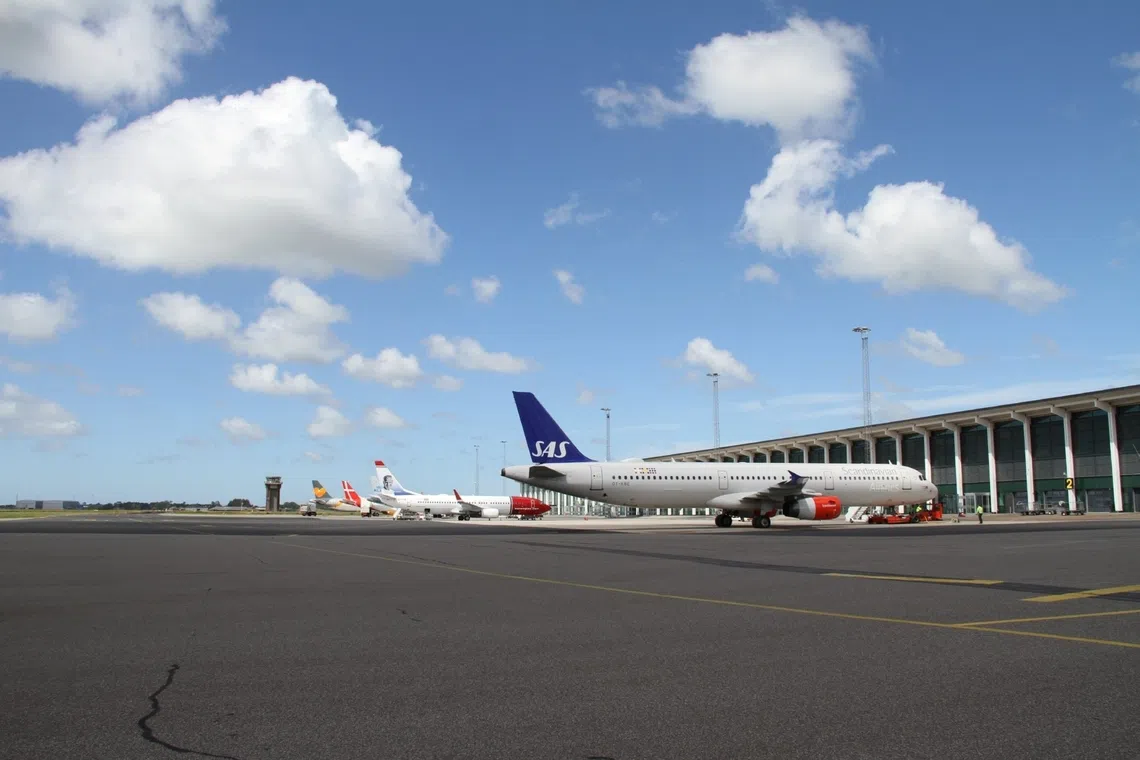Drones disrupt Danish airports for second time in a week; Russia denies involvement
Sign up now: Get ST's newsletters delivered to your inbox

The incident is part of what some European officials see as a pattern of Russian disruption that has exposed the vulnerability of European airspace.
PHOTO: AALBORGLUFTHAV/X
COPENHAGEN – Denmark said on Sept 25 that drone incursions that briefly shut two of its airports and affected military installations overnight were hybrid attacks intended to spread fear, but said it did not know who was behind them.
The incident, the second in two days in Denmark alone, is part of what some European officials see as a pattern of Russian disruption that has exposed the vulnerability of European airspace at a time of high tensions between Moscow and Nato.
Poland shot down suspected Russian drones
Danish authorities said on Sept 25 they decided not to take down any of the drones in its airspace for safety reasons, despite the disruption caused to air traffic.
Russia’s embassy in Copenhagen rejected as “absurd” speculation about Moscow’s involvement in the Danish incursions.
Danish Prime Minister Mette Frederiksen said she had spoken on Sept 25 with Nato Secretary-General Mark Rutte about the drone incidents and that they had agreed to work together to ensure security.
Denmark’s unpreparedness in focus
The incursions forced Aalborg airport, used for commercial and military flights, to shut for three hours, while Billund airport, Denmark’s second-largest, was closed for an hour, police said.
Both reopened on Sept 25 morning.
Drones were also seen near airports in Esbjerg and Sonderborg, as well as Skrydstrup airbase, home to some of Denmark’s F-16 and F-35 fighter jets. All five are located on the Jutland peninsula in western Denmark.
“This shows at least that we do not have the capacity at present to prevent the intrusion of drones over our airports,” Dr Peter Viggo Jakobsen, an associate professor at the Royal Danish Defence College, told Reuters.
“This is a hole in our preparedness.”
The incursions come after Denmark boosted its military budget to address acute shortcomings in 2025.
Last week, it announced plans to acquire long-range precision weapons, while its decision to host Ukrainian missile fuel production near the Skrydstrup airbase has drawn criticism from Russia.
Police said the drones followed a similar pattern to those that halted flights at Copenhagen airport overnight into Sept 23
“It certainly does not look like a coincidence. It looks systematic. This is what I would define as a hybrid attack,” Danish Defence Minister Troels Lund Poulsen told reporters, adding that the country was facing no direct military threat.
Head of Denmark’s armed forces Michael Hyldgaard acknowledged weaknesses in the country’s ability to counter drone attacks.
“We have a wide range of capabilities in the armed forces, but we would like to have more,” he said.
Danish opposition lawmaker Pelle Dragsted of the Red-Green Alliance slammed the government’s handling of the incidents, saying on X: “Billions (are being) allocated to defence ... But no control over the most basic thing: Defence of our own vulnerable infrastructure.”
Denmark has pointed finger at Russia
Ms Frederiksen described the incident as the most serious “attack” yet on its critical infrastructure
Authorities in Norway also shut the airspace at Oslo airport for three hours on the evening of Sept 22 after reports of a drone flying in the area.
Dr Jakobsen also pointed the finger at Moscow.
“So the Russians - if it’s them, and I think it is - are doing what they’ve been really good at for a long time: they’re going right to the edge of what would trigger a military response from Nato, but not over it,” he said.
Mr Poulsen stressed on Sept 25 that there was no evidence linking the recent drone activities to Russia.
He also said Denmark had not yet decided whether to follow Poland’s example this month and invoke Nato’s Article 4, which allows members to request consultations over any security concerns.
The drone incursions come as Denmark, current holder of the European Union’s rotating presidency, prepares to host EU leaders in Copenhagen next week. REUTERS


